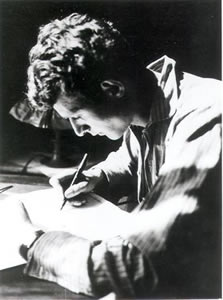De Engelse dichter, essayist en schrijver Stephen Spender werd geboren op 28 februari 1909 in Londen. Zie ook alle tags voor Stephen Spender op dit blog.
Uit: World within world
„During these months, a most poignant event, the suicide of Virginia Woolf, was observed by me as through a thick pane of glass, seen very clearly, but all sound shut out: the personal tragedy seen through the vast transparent impersonal one.
For the time being, the only hope was that the current of power should be reversed and turned back on those who had first employed it: that the pendulum of the bombers, swinging over us, should swing back again over Germany. Yet to admit this was an admission of spiritual defeat: for it was to say that hope lay in power, in opposing despair with despair. We said this, with the result that we are still saying it. All this has implied the surrender of the only true hope for civilization—the conviction of the individual that his inner life can affect outward events and that, whether or not he does so, he is responsible for them.
From now on, the fate of individuals was more and more controlled by a public fate which itself seemed beyond control. For control implies not merely putting a machinery into motion, but also being able to make it stop: modern war is a machine easy to make start, but it can only be stopped at the moment when it has destroyed or been destroyed by another war machine. Control means being able to relate a programme of action to the results of that action. Now we had arrived at a stage when a large part of the resources of great nations were poured into programmes of which no one could foresee the results. All this was only leading to subsequent plans for making atomic and hydrogen bombs to defend East against West or West against East in a meaningless struggle between potential ashes to gain a world of ashes. For, in the course of the struggle, the vast “machinery of production,” together with its capitalist or proletarian owners, and all the sacred theories of whichever class, would be as outmoded as its own ruins, like the civilization and theories of Babylonian astrologers.
That part of living which was devoted to spiritual and personal values, became a marginal activity in society, and for individuals a side-line, unless they happened to be old, sick, or socially unreliable. The most serious result was the effect on the minds of individuals, particularly the young, who found themselves in a world where no action of theirs, and nothing they created or thought, could alter the course of events. Here, though, on the level of thought and spiritual life, was the real challenge. For it is intolerable that men who, with their minds, have invented machines of destruction, and in their policies made themselves the half-slaves of these machines, should not be able to unthink what is a product of their intellects.“

In 1932
Lees verder “Stephen Spender, Luc Dellisse, Bodo Morshäuser, John Montague”

